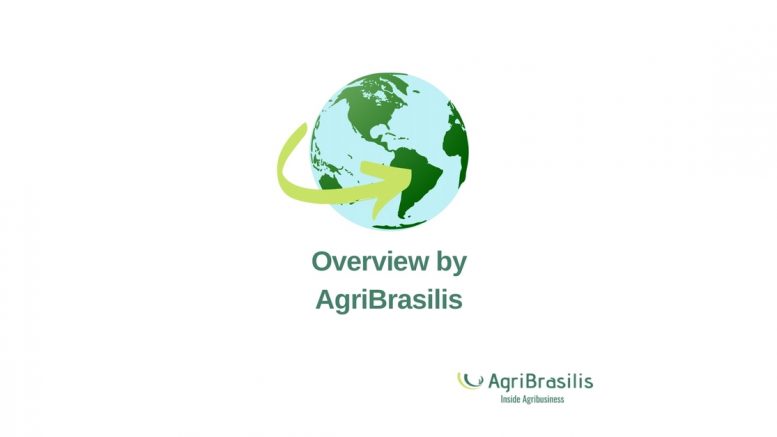Resistance to pesticides for insect, disease and weed control is increasing. In soybean, 100% of Cercospora spp. is resistant to strobilurin fungicides. Another example is the Spodoptera frugiperda caterpillar, known as fall armyworm, which is resistant to corn Bt proteins, Cry1A105 and Cry2Ab. (Pest Management Network)
Ministry of Agriculture delivers 30 tonnes of sugar to beekeepers in the Corrientes region, due to the climate emergency. There was a lack of flowering due to fires and drought. (Minagri)
GanAr Plan is launched to increase meat production by 600 thousand tonnes by 2030, in addition to improving herd management and increasing the slaughter weight of cattle. (Ministry of Agriculture, Livestock and Fisheries)
![]()
Federation of Cattle Farmers of Santa Cruz signs an agreement with Brazilian Agricultural Research Corporation, aiming to improve livestock and agriculture in the country. Embrapa has experience with genetics and pastures for cattle. (Embrapa)
![]()
China suspends temporarily imports of beef from 4 Brazilian slaughterhouses. Imports from Marfrig unit in Promissão, in State of São Pulo, are suspended for four weeks, and one unit at the Várzea Grande unit, State of Mato Grosso. Imports from two JBS refrigeration sites, in Senador Caneda, State of Goias, and Lins, State of São Paulo, were also suspended for one week. (General Administration of Customs of China)
Freight prices decline in States of Mato grosso, Mato Grosso do Sul, Bahia and Goiás. Price decrease occurs due to the reduction in internal transportation, especially in the soybean harvest. A decline of soybean exports was observed throughout April, with a drop of 6.3%. (Conab)
According to Ibrafe, Brazilian carioca dry-beans will run out before the end of the year, and there will be no means to supply the national demand. The only country from which beans can be imported is Argentina, and it has just gone through frosts that reduced production. According to Marcelo Lüders, president of the Institution, the removal of import taxes will have no impact on prices. (Brazilian Institute of Beans and Pulses)
Soybean exports from the State of Pará grow 124% between January and April 2022, when compared to the same period of the previous year. Exports were approximately U$ 417 million. (Federation of Agriculture and Livestock of Pará)
Delays in inspection of trucks transporting corn from Paraguay and Argentina results in estimated losses of U$ 16 million. Hundreds of trucks are waiting at the border of Paraguay and Brazil, in Foz do Iguaçu, State of Parana. (Poultry Organization of Rio Grande do Sul)

![]()
Price decrease of lemons, oranges, apples, kiwis and spinach. Lemon price dropped 37% in just one month. In the Valparaíso region, apple prices dropped 17% at the market and 57% at fairs, while kiwifruit prices dropped by 19% and 68%, respectively. (Office of Agricultural Studies and Policies)
Auditors from the Ministry of Agriculture visit the state of Espírito Santo in Brazil to verify the phytosanitary control in papaya production, aiming to open up the Chilean market for exports of the product. (Ministry of Agriculture)
![]()
Government shall subsidize more than 4 thousand small farmers that plant bananas who were harmed by the war in Ukraine. (SFM and Agrocalidad)
![]()
Export of avocados without phytosanitary restrictions to Costa Rica begins. (SAG)
Mexico has reached sufficient sugar production to supply the domestic market and export. Expected production is 5.68 million tonnes. US assigned Mexico’s import quota of 887,000 tonnes. (Secretary of Agriculture)
In 5 years, pork exports increased 134%. (Comecarne)

![]()
Delegations from Brazil and Colombia travel to the country for a series of activities to exchange experiences, good practices and technological innovations adapted to family cotton production. (FAO, MAG, ABC/MRE and MADR)
Meeting with representatives from Vietnam and Malaysia to strengthen trade and economic relations, mainly in food exports and industrial investments in the country. (MAG)
![]()
Tropical Andes lost 42% of their glacier surface in 30 years, due to climate change. Melting ice has environmental and economic impacts, affecting habitats where alpacas are raised. (La Molina National Agrarian University)
![]()
Increase in the purchase and lease of land, mainly by Argentines, Brazilians and Chileans. The main areas where there is demand from investors are those dedicated to forestry production. (Ministry of Agriculture)

READ MORE:

